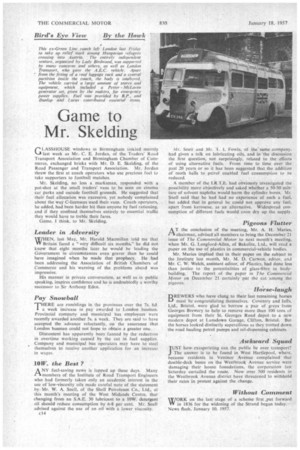Game to Mr. Skelding
Page 54

If you've noticed an error in this article please click here to report it so we can fix it.
LASSHOUSE windows in Birmingham tinkled merrily 'LS last week as Mr.. C. E. Jordan, of the Traders' Road Transport Association and Birmingham Chamber of Commerce, exchanged bricks with Mr. D. E. Skelding, of the Road Passenger and Transport Association. Mr. Jordan threw the first at coach operators who use precious fuel to take supporters to football matches.
Mr. Skelding, no less a marksman, responded with a pot-shot at the small traders' vans to be seen on cinema car parks and outside football grounds. He suggested that their fuel allocation was excessive, yet nobody complained about the way C-licensees used their vans. Coach operators, he added, had been harder hit than anyone by fuel rationing, and if they confined themselves entirely to essential traffic they would have to treble their fares.
Game. I think, to Mr. Skelding.
Leader. in Adversity
WHEN, last May, Mr. Harold Macmillan told me that W Britain faced a " very difficult six months," he did not know that eight months later he would be leading the Government in circumstances even graver than he could have imagined when he made that prophecy. He had been .addressing the Association of British Chambers of Commerce and his warning of the problems ahead was impressive.
His manner in private conversation, as well as in public speaking, inspires confidence and he is undoubtedly a worthy successor to Sir Anthony Eden. '
Pay Snowball
THERE are rumblings in the provinces over the 7s. 6d. I a week increase in pay awarded to London busmen. Provincial company and municipal bus employees were recently awarded another 5s. a week. They arc said to have accepted the advance reluctantly, on the assurance that London busmen could not hope to obtain a greater one.
Discontent has apparently been fanned by the reduction in overtime working caused by the cut in fuel supplies. Company and municipal bus operators may have to steel themselves to receive another application for an increase in wages.
10W. the Best ?
ANY fuel-saving news is lapped up these days. Many members of the Institute of Road Transport Engineers who had formerly taken only an academic interest in the use of low-viscosity oils made careful note of the statement by Mr. W. A. Snell, of the Shell Petroleum Co., LW., at this month's meeting of the West Midands Centre, that changing from an S.A.E. 30 lubricant to a 10W, detergent oil should reduce consumption by 6-8 per cent. Mr. Such advised against the use of an oil with it lower viscosity,
c14
Mr. Snell nod Mr. 1. 1, Fowle, ot the same company, had given a talk on lubricating oils, and in the discussion the first question, not surprisingly, related to the effects of using alternative fuels. From time to time over the past 20 years or so it has been suggested that the addition of moth halls to petrol enabled fuel consumption to be reduced.
A member of the 1.R.T.E. had obviously investigated the possibility more objectively and asked whether a 50-50 mixture of solvent naphtha would harm the cylinder bores. Mr. Snell said that he had had no experience of such a fuel, but added that in general he could not approve any fuel, apart from kerosene, as an alternative. Widespread consumption of different fuels would soon dry up the supply.
Pigeons Flutter
AT the conclusion of the meeting, Mr. A. H. Manes, chairman, advised all members to bring the December 21 issue of The Commercial Motor to next month's meeting, when Mr. G. Langford-Allen, of Bakelite, Ltd., will read a paper on the use of plastics in commercial-vehicle bodies. Mr. Manes implied that in their paper on the subject to the Institute last month, Mr. M. D. Curwen, editor, and Mr. C. W. Welch, assistant editor, of Plastics, had done less than justice to the potentialities of glass-fibre in bodybuilding. The report of the paper in The Commercial Motor on December 21 certainly put the cat among the pigeons.
Horse-laugh
DREWERS who have clung to their last remaining horses 1--; must be congratulating themselves. Coventry and Jeffs. Ltd., Bristol, were glad to borrow a pair of greys from Georges Brewery to help to remove more than 100 tons of equipment from their St. Georges Road depot to a new modern depot at Lansdown Garage, Clifton, Bristol_ But the horses looked distinctly supercilious as they trotted down. the road hauling petrol pumps and oil-dispensing cabinets.
Awkward Squad
JUST how exasperating can the public Be over transport' The answer is to be found in West Hartlepool, where. because residents in Ventnor Avenue complainedthat double-deck buses on the Westbrook Avenue service were damaging their house foundations, the corporation last Saturday curtailed the route_ Now over 500 residents in the Westbrook Avenue district have threatened to withhold their rates in protest against the change.
Without Comment
WORK on the last stage of a scheme first _put forward W in 1836 for the widening of the Strand began today. News flash, January 10. 1957.








































































































